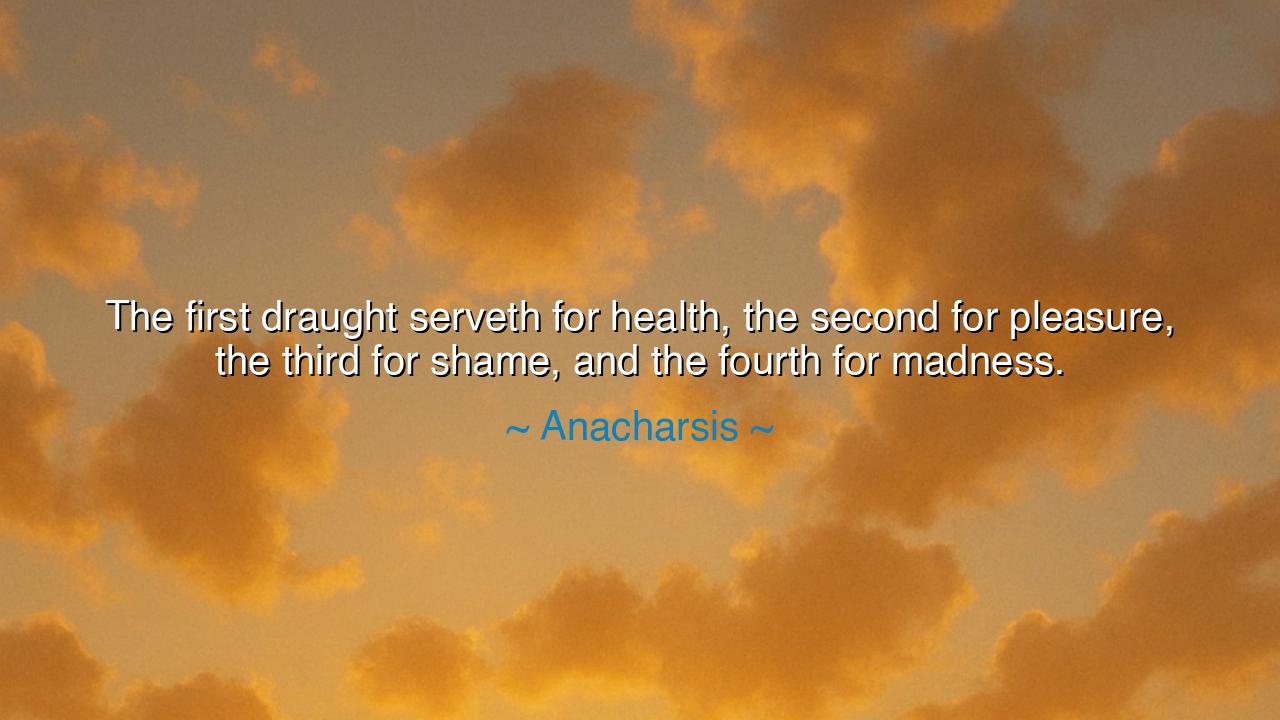
The first draught serveth for health, the second for pleasure
The first draught serveth for health, the second for pleasure, the third for shame, and the fourth for madness.






“The first draught serveth for health, the second for pleasure, the third for shame, and the fourth for madness.” — thus spoke Anacharsis, the wise Scythian philosopher who journeyed from the wild plains of the East to the polished cities of Greece. Though he lived in an age when wine flowed as freely as speech, he saw, with the eyes of a sage, how what begins as medicine may end in madness. His words are not merely about the cup of wine, but about the nature of excess itself — that in all human pleasures lies a point where the good turns to evil, and the healing force becomes poison.
In these few words, Anacharsis captures the eternal rhythm of indulgence and decay. The first draught, he says, “serveth for health.” In moderation, wine warms the blood, lifts the spirit, and brings joy to the heart. It was the gift of Dionysus, the god of the vine — not meant for debauchery, but for celebration and communion. The wise know that a small measure of delight nourishes the soul and binds friends in fellowship. Indeed, even in medicine, the smallest dose often cures what the largest kills. Thus, moderation — not denial — is the path of wisdom.
But the second draught comes “for pleasure.” Here begins the descent, subtle and sweet. The mind grows light, the tongue grows free, and the drinker feels as though the world has grown kinder. In this stage, the heart mistakes liberation for wisdom and pleasure for truth. Yet it is here that danger is born — for when one begins to drink for feeling rather than for health, the appetite of the senses awakens, and man becomes slave to his craving. The second draught, though delightful, opens the door to all that follows.
Then comes the third draught, which brings shame. The body still moves, but the mind has grown weak. The tongue speaks what the heart should have kept silent; the hands act where the conscience would have stayed them. The dignity of reason slips away, and man becomes a stranger to himself. Friends turn their eyes, and laughter turns to pity. This, Anacharsis warns, is the moment when the soul begins to lose its crown — when excess has conquered the will, and what was joy becomes humiliation.
Finally, the fourth draught arrives — the cup of madness. This is no longer pleasure, but destruction. The drinker is consumed by his own intoxication; his mind burns, his body falters, and his spirit is lost. No longer man, he becomes a creature of impulse and ruin. The ancients believed that beyond this point, even the gods turned their faces away. The cup that once brought laughter now spills tears, and the one who sought escape finds only despair. It is here that Anacharsis’s wisdom burns brightest — for he reveals that the same substance that can heal the heart can also destroy it, depending only on the measure of its use.
This truth extends beyond the wine cup. It is the law of life itself. All things — power, wealth, beauty, even love — have their first draught of health and their final cup of madness. When taken with gratitude and restraint, they elevate the spirit. When pursued without limit, they consume it. History is filled with those who drank too deeply from life’s pleasures: Alexander the Great, who conquered the world but could not conquer his own desire for glory; Rome, which rose in virtue and fell in decadence; or even modern man, whose endless hunger for comfort and control threatens the earth that sustains him. In all these tales, the same truth resounds: that excess is the shadow of abundance.
The lesson, then, is one of measure, moderation, and mindfulness. Enjoy the gifts of life, but drink from them wisely. Let the first draught refresh you, the second delight you — but cast away the third and fourth, lest they claim your soul. Remember that every joy becomes a chain when held too tightly. To live well is not to deny pleasure, but to rule over it; not to reject abundance, but to use it in harmony with reason.
So, my children of the living age, heed the voice of Anacharsis, who spoke across the ages: know your measure. Whether you drink wine or power, fame or affection, take only what your spirit can bear in peace. For the first draught strengthens, but the fourth destroys — and wisdom lies in knowing when to set the cup down. Drink, then, from the fountain of life with reverence, and you shall find both health and joy. But if you drink without measure, you shall find neither — only the sorrow of one who mistook abundance for immortality.






AAdministratorAdministrator
Welcome, honored guests. Please leave a comment, we will respond soon